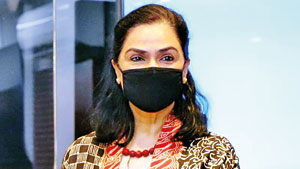News
‘Accelerate the jabs for priority groups and ensure public health and social measures’
The critical need is for Sri Lanka to accelerate vaccination, especially among the priority groups, reiterated the Country Representative of the World Health Organization (WHO), Dr. Alaka Singh this week.
Commending Sri Lanka’s vaccination against COVID-19 as “outstanding”, she pointed out that this must be kept up with the third dose, as otherwise the entire effort could be in jeopardy. The priority groups where vaccination should be accelerated include those over 60, those with weak immune systems and health workers.

Dr. Alaka Singh
To date, 7 Omicron cases have been detected through sequencing in Sri Lanka.
The WHO’s overall risk assessment for the South-East Asia Region on the likelihood of the potential introduction of Omicron and its subsequent spread in the community is “very high”. The WHO updates the risk assessment regularly and this information is available on the WHO website. The region has already experienced rapid replacement in the case of the Delta variant, with Omicron showing a transmission advantage over Delta.
“Vaccinations must be coupled with effective implementation of public health and social measures (PHSM) to reduce COVID-19 circulation. The use of masks, physical distancing, hand hygiene and avoiding crowded and poorly-ventilated spaces remain key to reducing the transmission of COVID-19,” said Dr. Singh.
Looking at Sri Lanka’s recent past, she said that the 41-day extended lockdown demonstrated remarkable resilience and, again, its achievements should not be jeopardized now by ignoring public health and social measures, especially during the holiday season.
“Here, risk communication and community engagement through a whole of society approach have a pivotal role to play in addressing misinformation, especially about vaccines. Vaccines remain our best defence against severe illness and hospitalization from COVID-19. Evidence is now emerging on the possible waning of protection after the second dose or inadequate protection for those at-risk, requiring a third dose to maintain adequate immunity. Sri Lanka’s vaccination drive is aligned to evidence and needs to be backed by dissemination of accurate information,” she explained.
Dr. Singh said: “This is while readiness of healthcare systems must be in place to ensure adequate response to potential surges. Sri Lanka has adequate supplies of oxygen as well as backup options to reduce the pressure from hospitals including valuable experience with effective integrated care as well as home care management during the third wave. This ‘whole of government’ approach is needed again for preparedness against Omicron.
“Surveillance and sequencing arekey to better understanding of COVID-19 variants, including Omicron. Sri Lanka has world-class technical capacity and WHO is available to support further advancement in the area.
“2021 has been an extremely difficult year. We are still in the preparedness and response phase of this pandemic. Recovery would be an exceptional challenge given the unprecedented and prolonged impact on public health, social development and the economy, globally. We must continue the COVID-19 effort this holiday season by ensuring our elders are vaccinated with the third dose and we strictly follow all public health and social measures.”
99 countries have ‘verified’ Omicron cases
Next Dr. Singh looked at the situation around the globe in the light of the spread of the 5th ‘variant of concern’, Omicron.
How widespread is the Omicron
variant?
As of 22nd December, 99 countries reported verified cases of Omicron and an additional 11 are under verification. It is crucial to remember that the Delta variant is still very much present and it is in this scenario that the Omicron variant is superimposed.
The challenge then is strict adherence to public health and social measures and to urgently improve the uptake of the third vaccination dose especially among priority, at-risk populations – those over 60, the immune-compromised and healthcare workers.
How much do we know about the Omicron variant?
We are still gathering information and the current evidence is mainly from South Africa and the United Kingdom (UK).
Omicron has a substantial growth advantage over Delta. It spreads significantly faster than Delta, with a doubling time between 1.5-3 days and appears to spread even among populations with high levels of immunity. The UK has seen a 62% weekly increase in cases and, in a period of two weeks, at 70% of cases, Omicron is now the dominant variant.
At this point, we are uncertain whether the rapid growth rate is due to immune evasion, increased transmissibility or a combination of both.
There does appear to be cases among those fully vaccinated and those who have had prior infection, suggesting immune evasion. The data on vaccine efficacy/effectiveness arestill limited. But preliminary results from the UK show a reduction in vaccine effectiveness against symptomatic disease for Omicron, compared to Delta after two doses of Pfizer or AstraZeneca vaccines; and a higher effectiveness with a Pfizer booster, comparable to that against Delta.
Diagnostics do not appear to be influenced by Omicron and the routinely used PCR and antigen-based rapid diagnostic test (Ag-RDT) remain effective.
There is still limited data on the clinical severity of Omicron. More data are needed to understand the severity profile and how severity is impacted by vaccination and pre-existing immunity.
Preliminary analysis indicates a lower risk of hospitalization for Omicron compared to Delta in South Africa. In the UK, hospitalization indicators were not significantly associated with Omicron infection, suggesting at most limited changes in severity compared with Delta. In both countries, hospitalizations increased sharply and we need to prepare healthcare systems to prevent them from becoming overwhelmed quickly.
The best way to say that you found the home of your dreams is by finding it on Hitad.lk. We have listings for apartments for sale or rent in Sri Lanka, no matter what locale you're looking for! Whether you live in Colombo, Galle, Kandy, Matara, Jaffna and more - we've got them all!

